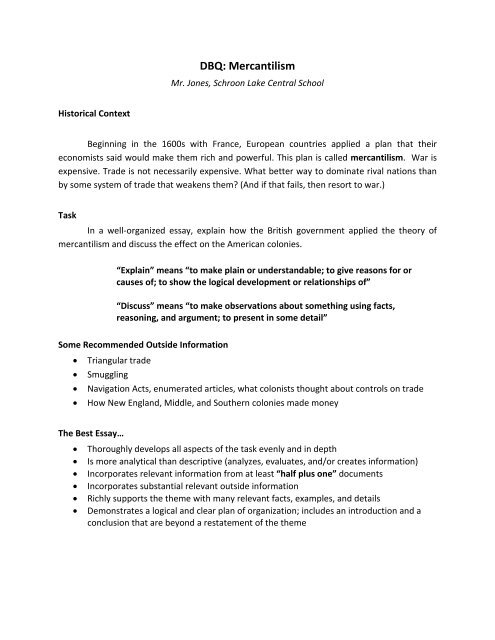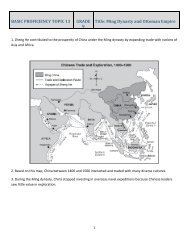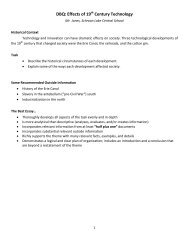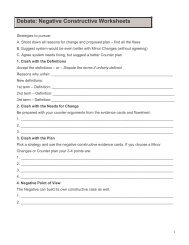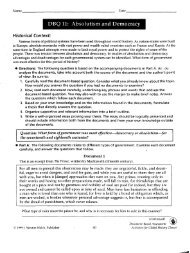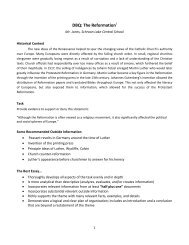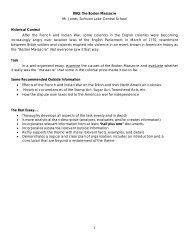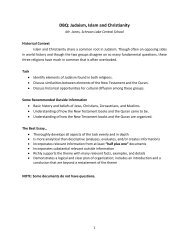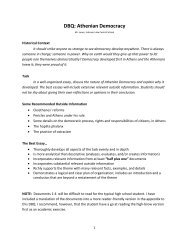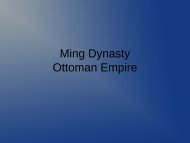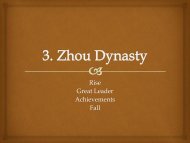DBQ Mercantilism
DBQ: Mercantilism - JonesHistory.net
DBQ: Mercantilism - JonesHistory.net
- No tags were found...
Create successful ePaper yourself
Turn your PDF publications into a flip-book with our unique Google optimized e-Paper software.
<strong>DBQ</strong>: <strong>Mercantilism</strong><br />
Mr. Jones, Schroon Lake Central School<br />
Historical Context<br />
Beginning in the 1600s with France, European countries applied a plan that their<br />
economists said would make them rich and powerful. This plan is called mercantilism. War is<br />
expensive. Trade is not necessarily expensive. What better way to dominate rival nations than<br />
by some system of trade that weakens them? (And if that fails, then resort to war.)<br />
Task<br />
In a well-organized essay, explain how the British government applied the theory of<br />
mercantilism and discuss the effect on the American colonies.<br />
“Explain” means “to make plain or understandable; to give reasons for or<br />
causes of; to show the logical development or relationships of”<br />
“Discuss” means “to make observations about something using facts,<br />
reasoning, and argument; to present in some detail”<br />
Some Recommended Outside Information<br />
• Triangular trade<br />
• Smuggling<br />
• Navigation Acts, enumerated articles, what colonists thought about controls on trade<br />
• How New England, Middle, and Southern colonies made money<br />
The Best Essay…<br />
• Thoroughly develops all aspects of the task evenly and in depth<br />
• Is more analytical than descriptive (analyzes, evaluates, and/or creates information)<br />
• Incorporates relevant information from at least “half plus one” documents<br />
• Incorporates substantial relevant outside information<br />
• Richly supports the theme with many relevant facts, examples, and details<br />
• Demonstrates a logical and clear plan of organization; includes an introduction and a<br />
conclusion that are beyond a restatement of the theme
Document 1<br />
What is mercantilism?<br />
<strong>Mercantilism</strong>, an economic system that stresses the goals of the national government<br />
rather than the individual […] <strong>Mercantilism</strong> was the main economic system in Europe<br />
during the sixteenth, seventeenth, and eighteenth centuries. This system required the<br />
national government to strictly control businesses to meet certain objectives, such as<br />
exporting (selling) more goods to other countries than importing (buying) goods from<br />
other countries. Within a country, trade barriers (such as taxes) were dropped.<br />
According to mercantilist philosophy, [using] the natural resources of a nation's<br />
colonies was a worthwhile effort.<br />
Enotes.com. What is mercantilism? 03 Nov. 2009. http://www.enotes.com/history-fact-finder/economics-business/whatmercantilism<br />
1. What are two ways mercantilism was supposed to make a country powerful?<br />
Document 2<br />
“[…] from thence forward, no goods or commodities whatsoever shall be<br />
imported into or exported out of any lands […] in any other […] ships or […]<br />
vessels whatsoever, but in such ships or vessels as do truly and without fraud<br />
belong only to the people of England […] or are built of and belonging to any<br />
the lands [of English people] and whereof the master and three fourths of the<br />
mariners at least are English.”<br />
Navigation Act of 13 September 1660<br />
1. If you were a merchant in the colonies in the 1660s, what is the only legal way to ship your<br />
goods by sea?
Document 3<br />
“[…] That from and after [25 December 1733] there shall be […] paid unto and<br />
for the use of His Majesty … upon all rum or spirits […] the sum of nine pence,<br />
money of Great Britain […] for every gallon thereof. […] and upon all molasses<br />
or syrups of such foreign produce or manufacture […] which shall be brought<br />
into said colonies […] the sum of sixpence of like money for every gallon<br />
thereof.”<br />
Molasses Act, 1733<br />
1. What are TWO items being taxed by the Molasses Act?<br />
2. Why would New Englanders hate this law?<br />
3. What would a British sugar plantation owner think of this law?<br />
Document 4<br />
“But in spite of all efforts the Navigation Acts could scarcely be enforced at all. It<br />
may be said that the whole people became lawbreakers, and often the customs<br />
officials and even the governors connived at their practice. Smuggling was<br />
universal. It went on regardless of the admiralty courts established in most of<br />
the colonies. "Juries found their verdicts against the most undoubted facts." The<br />
Molasses Act was certainly an economic and a political [mistake]; it not only<br />
made the people lawbreakers, it led them to hold Parliament in contempt, as<br />
not able to enforce its own laws.”<br />
History of the USA: The Navigation Acts. 03 Nov. 2009. http://www.usahistory.info/colonial/Navigation-Acts.html<br />
1. According to document 4, what was the main problem with the Navigation Acts?
Document 5<br />
“[…] no sugars, tobacco, cotton-wool, indigoes, ginger, fustic, or other dyeing<br />
wood, of the growth, production, or manufacture of any English plantations in<br />
America […] shall be […] transported from any of the said English plantations to<br />
any land […] other than to such other English plantations as do belong to his<br />
Majesty […] under penalty of the forfeiture of the said goods, or the full value<br />
thereof, as also of the ship, with all her guns, tackle, apparel, ammunition, and<br />
furniture[…]”<br />
Navigation Act of 13 September 1660<br />
1. How does this portion of the Navigation Acts limit trade?<br />
2. What is the penalty for smugglers?<br />
Document 6<br />
“Some things, however, the Parliament did purely to favor the colonies, -- it<br />
prohibited the raising of tobacco in England and kept Spanish tobacco out by<br />
high duties (duty = tax), it kept out Swedish iron by a high tariff [tariff = tax on<br />
imports], to the advantage of the colonies, and it paid a bounty on various<br />
colonial products.”<br />
History of the USA: The Navigation Acts. 03 Nov. 2009. http://www.usahistory.info/colonial/Navigation-Acts.html<br />
1. What are THREE ways the Navigation Acts actually helped the colonies?


